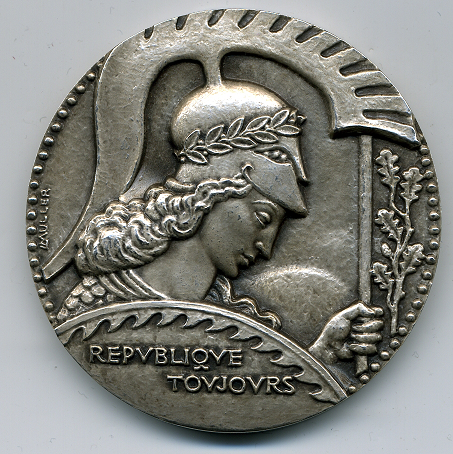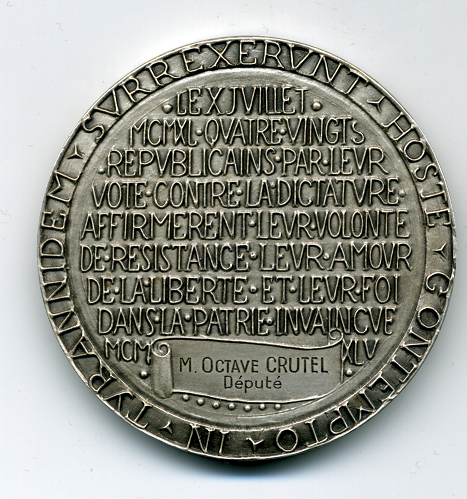10 July 1940: a medal for those who said “No”
Maurice Bleicher collection
The last act of the Third Republic was the vote granting full constitutive powers to Marshal Pétain, held on 10 July 1940 in Vichy casino, by a national assembly of 671 parliamentarians from the Senate and Chamber of Deputies. Absent from the vote were the communists, who had their mandates terminated following the German-Soviet pact, those who had left for North Africa on the Massilia and been excluded from the vote, those killed in the fighting and those prevented from voting due to the circumstances. There were only 80 “No” votes, with 570 “Yes” votes and 20 abstentions.
In 1945, a medal was awarded to those 80 parliamentarians. Engraved by Louis Müller and struck in silver by the Paris Mint, the front of the medal depicts a helmeted, armed Minerva holding a shield that bears the words “Republic forever”. On the reverse, the Latin words In tyrannidem surrexerunt hoste contempto (“They rose up in defiance of the enemy against tyranny”) surround the dedication “On 10 July 1940, 80 Republicans, by voting against dictatorship, asserted their desire for resistance, their love of freedom and their faith in their unbeaten nation, 1945.”
The medal shown here was awarded to deputy Octave Crutel.
Born on 4 December 1879 in Aucrétiéville-Saint-Victor (Seine-Inférieure), Crutel, a doctor based in Rouen, was wounded three times in the First World War.
He was elected deputy for Seine-Inférieure in 1932. A member of the Radical and Radical-Socialist Republican Group, he was re-elected at the 1936 elections and sat on the social welfare and security, employment and universal suffrage committees. He was vice-chairman of the Radical-Socialist Parliamentary Group from 1936 to 1940.
On 10 July 1940, at the Vichy Congress, he was one of “the eighty” who voted against the delegation of powers to Marshal Pétain. He subsequently joined the Resistance, and his patriotism led him to be deported to Buchenwald. On his return, he became a member of the Provisional Consultative Assembly. He was also vice-chairman of the executive committee of the Radical Party, from September 1945. He was not re-elected in the legislative elections of 17 June 1951, and he died in Rouen on 28 March 1961.



